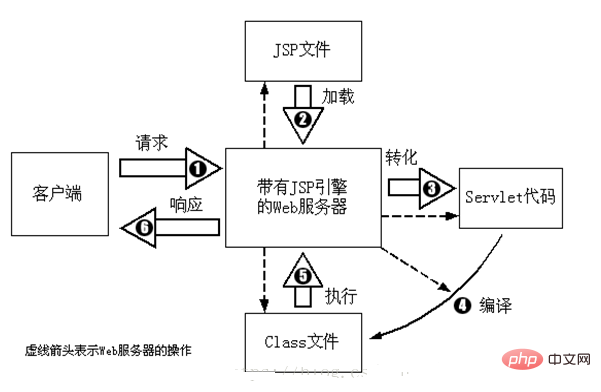How to run jsp file
How to run the jsp file: First, the client sends a Request request, and the JSP Container translates the JSP into the Servlet source code; then compiles the generated Servlet source code and loads it into the memory for execution; finally, the result is Just respond to the client.

When the client browser sends a request to the server to access a JSP page, the server loads the corresponding JSP page according to the request and compiles the page. , and then execute.
Recommended course: Java Tutorial.
The execution process of the page is shown in the figure below:

#The client sends a request to the server through the browser, and the request contains the requested resource path, so that when the server receives the request, it can know the requested content.
The server loads the corresponding JSP file according to the received client request.
The JSP engine in the Web server will convert the loaded JSP file into a Servlet.
The JSP engine compiles the generated Servlet code into a Class file.
The server executes this Class file.
Finally, the server sends the execution results to the browser for display.
As you can see from the above explanation, after the JSP file is converted by the JSP engine, it is compiled into a Class file. Finally, the server responds to the client's request by executing this Class file. The third and fourth steps constitute the translation stage in the JSP processing process, while the fifth step is the request processing stage.
But not every request needs to be repeated. When the server receives a request for a page for the first time, the JSP engine begins to compile the requested JSP file into a Class file according to the above process. When the page is requested again, if there are no changes to the page, the server will directly call the corresponding Class file for execution. Therefore, when a JSP page is requested for the first time, there will be some delay, but when accessed again, it will feel much faster. If the requested page has been modified, the server will recompile the file and then execute it.
How jsp runs
**jsp - JSP engine converted into Servlet - Java compiled into .class file - by Java virtual machine Explanation and execution
The execution process of Web container processing JSP file requests mainly includes the following four parts:
The client issues a Request request
JSP Container translates JSP into Servlet Source code
Compile the generated Servlet source code and load it into the memory for execution
Response the result to the client
Many people will think that JSP The execution performance will be very different from that of Servlet. In fact, the difference in execution performance is only in the first execution. Because JSP will be compiled into a Servlet class file, that is, .class, after it is executed for the first time. When the execution is called repeatedly, the Servlet generated for the first time will be executed directly without recompiling JSP into Servelt. Therefore, in addition to the first compilation taking a long time, the execution speed of JSP and Servlet is almost the same.
When executing a JSP web page, it can usually be divided into two periods: Translation Time and Request Time
Translation period: JSP web pages are transferred into Servlet classes.
Request period: After the Servlet class is executed, the response result is sent to the client.
Two things were done during the translation period:
Translation period: Transfer the JSP web page to Servlet source code.java.
Compilation period: Compile the Servlet source code.java Into Servlet class.class.
When the JSP webpage is executing, the JSP Container will do the checking work. If it is found that the JSP webpage has been updated and modified, the JSP Container will compile the JSP into a Servlet again; if the JSP has not been updated. , directly execute the previously generated Servlet.**
The above is the detailed content of How to run jsp file. For more information, please follow other related articles on the PHP Chinese website!

Hot AI Tools

Undresser.AI Undress
AI-powered app for creating realistic nude photos

AI Clothes Remover
Online AI tool for removing clothes from photos.

Undress AI Tool
Undress images for free

Clothoff.io
AI clothes remover

AI Hentai Generator
Generate AI Hentai for free.

Hot Article

Hot Tools

Notepad++7.3.1
Easy-to-use and free code editor

SublimeText3 Chinese version
Chinese version, very easy to use

Zend Studio 13.0.1
Powerful PHP integrated development environment

Dreamweaver CS6
Visual web development tools

SublimeText3 Mac version
God-level code editing software (SublimeText3)

Hot Topics
 1371
1371
 52
52
 Is jsp front-end or back-end?
Jan 28, 2023 pm 06:23 PM
Is jsp front-end or back-end?
Jan 28, 2023 pm 06:23 PM
jsp belongs to the backend. The essence of jsp is a servlet, and servlet is a server-side java application, so jsp is a back-end technology. JSP is deployed on the web server and can respond to requests sent by the client and dynamically generate web pages of HTML, XML or other format documents based on the request content, and then return them to the requester. JSP technology uses Java as a scripting language to provide services for user HTTP requests, and can handle complex business requirements together with other Java programs on the server.
 How to integrate JSP in SpringBoot project
May 12, 2023 pm 07:40 PM
How to integrate JSP in SpringBoot project
May 12, 2023 pm 07:40 PM
After the new springboot project is created, the directory is as follows: Step 1: Add the jar package code required to configure jsp to the project's pom file: org.apache.tomcat.embedtomcat-embed-jasperprovided Step 2: Create a new directory webapp under the main path , create a new path WEB-INF under webapp, create a new path jsp under WEB-INF, and place the jsp file we want to use under this path. Step 3: Configure the access path and suffix code of the jsp file in the main configuration file: spring .mvc.view.prefix=/WEB-INF/jsp/sp
 What is the difference between jsp and html
Jan 09, 2024 am 10:46 AM
What is the difference between jsp and html
Jan 09, 2024 am 10:46 AM
The difference between jsp and html: 1. Operating mechanism; 2. Purpose; 3. Relationship with Java; 4. Function; 5. Relationship with back-end; 6. Speed; 7. Maintainability and scalability; 8. Learning and use Difficulty; 9. File suffixes and identification tools; 10. Community and support; 11. Security. Detailed introduction: 1. Operating mechanism. HTML is a markup language, mainly used to describe and define the content of web pages. It runs on the client and is interpreted and executed by the browser. JSP is a dynamic web page technology that runs on the server side, etc. wait.
 How to implement jsp paging function
Mar 04, 2024 pm 04:40 PM
How to implement jsp paging function
Mar 04, 2024 pm 04:40 PM
Implementation steps: 1. Introduce the JSTL tag library into the JSP page; 2. Obtain data from the database; 3. Paging the data; 4. Display the paging navigation bar in the page; 5. Display the number according to the current page number and each page. , just get the corresponding data from the paging data and display it on the page.
 What format is jsp?
Jan 24, 2024 pm 04:01 PM
What format is jsp?
Jan 24, 2024 pm 04:01 PM
JSP is a dynamic web technology standard. Its file format is to insert Java program segments (Scriptlet) and JSP tags (tags) into traditional web page HTML files (.htm, .html) to form JSP files (*.jsp ).
 How to use jsp+mysql to implement paging query on web pages
May 30, 2023 pm 03:58 PM
How to use jsp+mysql to implement paging query on web pages
May 30, 2023 pm 03:58 PM
1. The core sql statement to implement paging query (1) The sql statement to query the total number of records in the database: selectcount(*)from+(table name); (2) The sql statement to query the number of records for each query: where: 0 is searched Index, 2 is the number of items searched each time. select*from table name limit0,2; 2. Code implementation* I wrote these two classes in the previous article, DBconnection class: used to obtain database connections, Author object class. Click on the link to view the code for these two classes. Click the link to view the DBconnection class and Author object class (1) Login page: index.jsp. Inserttitlehere user column
 Java technology stack for web development: Understand Java EE, Servlet, JSP, Spring and other technologies commonly used in web development
Dec 26, 2023 pm 02:29 PM
Java technology stack for web development: Understand Java EE, Servlet, JSP, Spring and other technologies commonly used in web development
Dec 26, 2023 pm 02:29 PM
JavaWeb development technology stack: Master JavaEE, Servlet, JSP, Spring and other technologies used for Web development. With the rapid development of the Internet, in today's software development field, the development of Web applications has become a very important technical requirement. As a widely used programming language, Java also plays an important role in the field of Web development. The JavaWeb development technology stack involves multiple technologies, such as JavaEE, Servlet, JSP, Spr
 Can JSP be replaced by PHP?
Mar 21, 2024 am 11:03 AM
Can JSP be replaced by PHP?
Mar 21, 2024 am 11:03 AM
Can JSP be replaced by PHP? JSP (JavaServerPages) and PHP (HypertextPreprocessor) are commonly used server-side scripting languages for dynamically generating web page content. Although they each have their own characteristics and advantages, can they completely replace each other in practical applications? This article will analyze the advantages and disadvantages of the two and compare them through specific code examples. First, let's take a look at the respective characteristics of JSP and PHP. JSP is a Java-based




